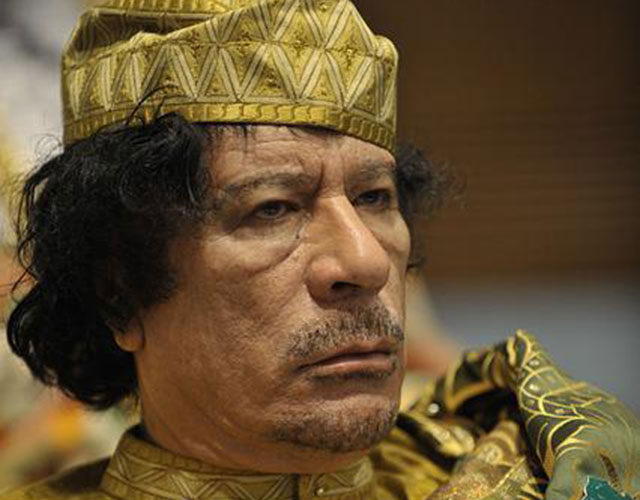Tripoli – A battle for control of Libya escalated on Tuesday as a rival prime minister tried to oust the UN-backed interim premier, sparking clashes in the capital Tripoli.
The North African nation has been in turmoil since dictator Muammar Gaddafi was overthrown in a Western-backed revolt in 2011.
– 2011: Gaddafi killed –
Encouraged by Arab Spring uprisings in Tunisia and Egypt, protests erupt in Libya in February 2011.
The United States, France and Britain give military backing to what becomes an armed revolt in the oil-rich Mediterranean country.
Gaddafi, in power for 42 years, flees the capital but rebels capture and kill him on October 20.
In August 2012, the rebels hand power to a transitional authority, the General National Congress (GNC).
– 2012: Foreign missions targeted –
As security deteriorates, US ambassador Chris Stevens and three American staff are killed in a September 11, 2012 attack on the US consulate in Libya’s second city, Benghazi.
An al-Qaeda-linked jihadist group is blamed.
After a car bomb attack on the French embassy in April 2013, most foreign diplomats leave the country.
– 2014-2016: Rival administrations –
Legislative polls are held in June 2014, creating a lower house of parliament – the House of Representatives – dominated by anti-Islamist forces.
But Islamist-led militias contest the results and storm Tripoli in August, restoring the GNC to power.
The internationally-recognised chamber takes refuge in the eastern city of Tobruk.
A rival body equivalent to Libya’s senate, formally known as the High Council of State, is established in Tripoli.
Libya finds itself with two administrations and two legislatures, one in Tobruk in the east, and the other in Tripoli in the west.
In December 2015, the rival parliaments sign a deal in Morocco establishing a Government of National Accord.
In March 2016, its head Fayez al-Sarraj arrives in Tripoli to install the new administration, but eastern military chief Khalifa Haftar – and the Tobruk assembly – refuse to recognise it.
– 2019: Haftar’s offensives –
Haftar, who has battled jihadists in Benghazi for three years, announces the second city’s “total liberation” in July 2017.
In January 2019, he mounts a raid on oil-rich southern Libya, seizing the region’s key city, Sebha, and one of the main oil fields.
In April, he orders troops – backed by Egypt, the United Arab Emirates as well as fighters from Russia’s controversial Wagner Group — to “liberate” Tripoli from “terrorists and mercenaries”.
The offensive stalls in the city’s southern reaches and, after a year of ruinous fighting, Turkish-backed forces in the west push him back to central Libya.
In June 2020, Tripoli says it has overrun Haftar’s last western stronghold.
– 2020-2021: Agreement on elections –
The rival administrations sign a “permanent” ceasefire in October 2020 after UN-hosted talks in the Swiss city of Geneva.
The following month, in neighbouring Tunisia, they agree to hold parliamentary and presidential elections on December 24, 2021.
Libyan delegates to the UN process approve an interim unity government headed by interim Prime Minister Abdulhamid Dbeibah, which takes office in March 2021.
– 2021: Election wrangling –
In September 2021, the head of the Tobruk assembly enacts election legislation which critics say favours Haftar.
Kadhafi’s son Seif al-Islam, Dbeibah and Haftar all announce presidential bids, stirring divisions over who should be allowed to run.
In December, Libya’s electoral commission suggests postponing the presidential election by a month but parliament refuses to agree on the new date.
– Two prime ministers –
In March 2022, Libya winds up with two governments.
One is headed by former interior minister Fathi Bashagha, which is supported by parliament.
The other is headed by Dbeibah in Tripoli, who refuses to stand down before parliamentary elections.
Groups acting in support of Bashagha block production at several oil fields and halt exports through the key terminal of Zueitina.
The closure of the Zueitina terminal prevents Libya from exporting almost a quarter of its 1.2 million barrels per day of production.
– Clashes in Tripoli –
On Tuesday, gun battles erupt in Tripoli after Bashagha lands in the capital with several members of his rival administration, saying he plans to take power.
He and his forces pull out of Tripoli a few hours later as the United States, United Nations and European Union call for calm.
Follow African Insider on Facebook, Twitter and Instagram
Source: AFP
Picture: Pixabay
For more African news, visit Africaninsider.com


